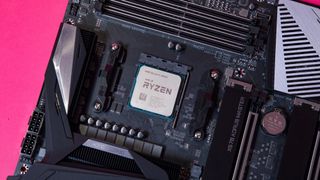AMD Ryzen 9 3950X beats out Threadripper 2950X in leaked benchmark
Consumer chip overpowers high-end desktop CPU

AMD’s Ryzen 9 3950X should be with us soon – with the chip expected to arrive in November, following a delay of a couple of months – and we just got a better idea of the sort of performance we can expect from the CPU.
This comes courtesy of alleged Geekbench 5 results for the processor spotted by TUM_APISAK (a regular leaker of CPU and GPU info).
AMD Ryzen 9 3950X - Geekbench 5https://t.co/APXUeVxN4Lhttps://t.co/3LhlsqK5DcOctober 18, 2019
The Ryzen 9 3950X actually appeared in two benchmarks, and in one case, the chip was nestled in an Asus Prime X570-P motherboard (backed with 64GB of RAM) where it recorded a single-core result of 1,276 and hit 15,401 in multi-core.
- Ryzen 9 3950X overclocked blows away Intel Core i9-9900K
- Best CPU cooler 2019: top CPU coolers for your PC
- These are all the best processors
The second benchmark in a Gigabyte B450 Aorus Pro WiFi motherboard witnessed a slightly higher score of 1,314 for single-core, but a considerably lower result of 11,140 when it came to multi-core. While both PCs were seemingly using DDR4-3600 memory, note that in this latter case, there was a much smaller quantity of 16GB system RAM (which doubtless had a bearing on things).
Ripping performance
Tom’s Hardware, which spotted the above tweet, also highlights the comparison made between the Ryzen 9 3950X and the Ryzen Threadripper 2950X. And that’s interesting to look at given that these are both 16-core (32-thread) chips with a base clock of 3.5GHz (albeit with 300MHz more boost for the 3950X, although that’s single-core – incidentally, the CPU’s all-core boost ran between 4.2GHz and 4.3GHz during these Geekbench tests). The 3950X has double the L3 cache (64MB), too.
At any rate, in the comparative match-up highlighted, AMD’s Ryzen 9 3950X beats out the Threadripper 2950X by 14% in single-core, and just under 4% in multi-core. And it does this with a TDP of 105W compared to 180W with the Threadripper.
That would appear to be a pretty glowing reflection on the efficiency of the Zen 2 architecture of AMD’s incoming Ryzen flagship when compared to 2nd-gen Threadripper – although of course, 3rd-gen Threadripper chips are just around the corner.
Are you a pro? Subscribe to our newsletter
Sign up to the TechRadar Pro newsletter to get all the top news, opinion, features and guidance your business needs to succeed!
And comparing consumer Ryzen processors to high-end desktop Threadripper models doesn’t strictly make sense, because they are obviously aimed at these different respective markets – and the latter has other benefits for the sort of heavyweight computing tasks it is designed to carry out. Like quad-channel memory for Threadripper rather than dual-channel, and 64 PCIe lanes versus 24 with consumer Ryzen.
So it isn’t an apples-to-apples comparison as such, but still, it’s an interesting one to draw nonetheless.
As ever, it’s well worth underlining that we can’t be sure if these Geekbench scores are genuine, and indeed there is only so much you can infer by looking at results from a single benchmarking utility, anyway.
Darren is a freelancer writing news and features for TechRadar (and occasionally T3) across a broad range of computing topics including CPUs, GPUs, various other hardware, VPNs, antivirus and more. He has written about tech for the best part of three decades, and writes books in his spare time (his debut novel - 'I Know What You Did Last Supper' - was published by Hachette UK in 2013).
Most Popular


